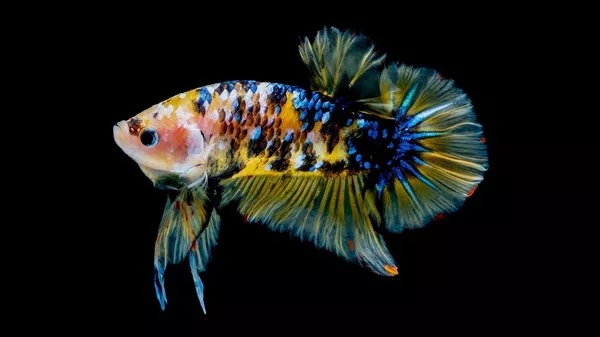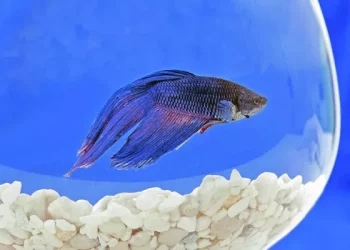Betta fish, scientifically known as Betta splendens, are renowned for their vivid colors, flowing fins, and aggressive territorial behavior. Native to Southeast Asia, these tropical fish are often kept as pets due to their striking appearance and relatively simple care requirements. However, one aspect of betta care that can sometimes be misunderstood is their tolerance for cold water. This article explores the factors that affect betta fish survival in cold water, including their natural habitat, physiological responses, and the implications for pet owners.
Understanding Betta Fish Natural Habitat
To grasp how betta fish react to cold water, it’s crucial to understand their natural environment. Betta fish are indigenous to the warm, shallow waters of Southeast Asia, including Thailand, Cambodia, and Vietnam. Their habitat includes slow-moving streams, rice paddies, and shallow ponds. The temperatures in these environments typically range between 75°F to 80°F (24°C to 27°C). This consistent warmth is vital for their health and well-being.
Physiological Adaptations to Temperature
Betta fish, like many tropical species, are ectothermic, meaning their body temperature is regulated by the surrounding environment. Unlike warm-blooded animals, bettas do not generate their own heat, so their metabolism and physiological processes are highly dependent on water temperature.
Metabolic Rate
The metabolic rate of betta fish increases with water temperature. In warmer conditions, bettas are more active, eat more, and grow faster. Conversely, in cooler temperatures, their metabolism slows down. This reduction in metabolic rate can affect their digestion, immune function, and overall activity levels.
Oxygen Levels
Cooler water holds more dissolved oxygen than warm water. While higher oxygen levels might seem beneficial, bettas are adapted to warm, low-oxygen environments. A sudden drop in temperature can lead to reduced oxygen availability and stress, which can adversely affect their health.
Effects of Cold Water on Betta Fish
Short-Term Exposure
When exposed to cold water for short periods, betta fish may exhibit a range of responses. They might become lethargic, reduce their feeding, and display unusual behaviors. Short-term exposure to temperatures below their comfort range can also compromise their immune system, making them more susceptible to infections.
Prolonged Exposure
Prolonged exposure to cold water can be far more detrimental. The critical temperature threshold for betta fish is around 72°F (22°C). Sustained temperatures below this can lead to severe health issues. Chronic exposure to cold water can result in:
Hypothermia: Reduced body temperature affects metabolic processes, leading to lethargy and reduced organ function.
Immunosuppression: The immune system becomes compromised, increasing susceptibility to bacterial and fungal infections.
Respiratory Issues: Cold water can lead to respiratory distress, as bettas may struggle to absorb oxygen efficiently.
Organ Failure: Prolonged cold stress can lead to organ failure and, ultimately, death.
Temperature Tolerance and Survival
Temperature Tolerance Limits
Betta fish are capable of surviving in a range of temperatures, but their tolerance has limits. Most bettas can survive in water temperatures as low as 68°F (20°C) for short periods. However, temperatures below this can lead to severe stress and health issues. Temperatures below 60°F (15°C) are generally considered dangerous and can be fatal if exposure is prolonged.
Survival Time in Cold Water
The exact duration a betta fish can survive in cold water depends on several factors, including:
Initial Health: A healthy betta might endure colder conditions longer than a stressed or sick fish.
Temperature: The lower the temperature, the shorter the survival time.
Acclimatization: Betta fish that are gradually exposed to cooler temperatures may cope better than those subjected to sudden drops.
Research and anecdotal evidence suggest that bettas might survive in temperatures just above freezing (around 40°F or 4°C) for very short periods, but survival at these temperatures is rare and usually involves significant health compromises.
See Also: How Often to Clean a 10 Gallon Betta Tank?
Mitigating Cold Water Risks
For pet owners, preventing exposure to cold water is essential. Here are some tips for ensuring a suitable environment for betta fish:
Temperature Monitoring
Regularly monitor the water temperature using a reliable aquarium thermometer. Maintain a stable temperature within the ideal range of 75°F to 80°F (24°C to 27°C).
Aquarium Heater
Invest in a quality aquarium heater designed for the size of your tank. Heaters help maintain a stable temperature and prevent fluctuations that can stress your betta fish.
Avoid Drafts
Ensure that the aquarium is placed in a location free from drafts and temperature extremes. Avoid placing it near windows, doors, or air conditioning vents.
Insulation
In cases where maintaining a stable temperature is challenging, consider using aquarium insulation or a tank cover to help regulate temperature.
Signs of Cold Stress and Health Issues
Pet owners should be vigilant for signs of cold stress in betta fish. These include:
Lethargy: Reduced activity and lethargy are common indicators of cold stress.
Loss of Appetite: A decrease in feeding can signal that the fish is struggling with temperature-related issues.
Clamped Fins: Betta fish may keep their fins close to their bodies as a response to cold stress.
Rapid Breathing: Difficulty in breathing or increased gill movement can indicate respiratory issues.
If you notice these signs, it’s crucial to address the temperature issues promptly and consult a veterinarian if symptoms persist.
Conclusion
Betta fish are beautiful and resilient pets, but their health and well-being are intricately tied to their environmental conditions. Understanding the impact of cold water on betta fish survival is essential for every owner. While bettas are adapted to warm, tropical environments, exposure to cold water can have serious consequences, ranging from stress and illness to death.
By providing a stable, warm environment and monitoring their health closely, pet owners can ensure that their betta fish thrive and remain vibrant. Cold water poses a significant risk to betta fish, and taking proactive measures to maintain appropriate temperatures is key to their long-term health and happiness.
Understanding the intricate needs of betta fish helps in offering them a healthy and fulfilling life, ensuring they continue to be a source of beauty and joy in your home.
Related Topics:

























